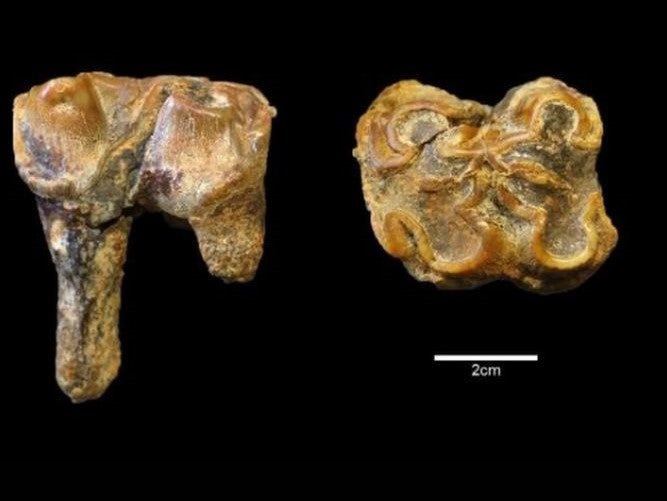Tooth reveals giant hippos roamed Somerset a million years ago
Animal would have weighed three tonnes and ranged across Europe; find also reveals new evidence about Ice Age climate

Your support helps us to tell the story
From reproductive rights to climate change to Big Tech, The Independent is on the ground when the story is developing. Whether it's investigating the financials of Elon Musk's pro-Trump PAC or producing our latest documentary, 'The A Word', which shines a light on the American women fighting for reproductive rights, we know how important it is to parse out the facts from the messaging.
At such a critical moment in US history, we need reporters on the ground. Your donation allows us to keep sending journalists to speak to both sides of the story.
The Independent is trusted by Americans across the entire political spectrum. And unlike many other quality news outlets, we choose not to lock Americans out of our reporting and analysis with paywalls. We believe quality journalism should be available to everyone, paid for by those who can afford it.
Your support makes all the difference.Scientists say they have found evidence that giant hippos roamed Britain much earlier than previously believed after a tooth dating back a million years was unearthed in Somerset.
The discovery – made by a team from the University of Leicester – is the first such fossil found in Britain older than 750,000 years.
It is thought to belong to a species, Hippopotamus antiquus, which weighed around three tonnes and ranged across Europe during the Ice Age.
Neil Adams, a PhD researcher leading the search at Westbury Cave, near Bath, called the discovery “very exciting”.
Writing in the Journal of Quaternary Science, he suggested the find would add to a sparse period in Britain’s fossils record, from about 1.8 million to 800,000 years ago.
“Erosion caused by the coming and going of ice sheets, as well as the gradual uplift of the land, has removed large parts of the deposits of this age in Britain,” he said.
“Our comparisons with sites across Europe show that Westbury Cave is an important exception and the new hippo dates to a previously unrecognised warm period in the British fossil record.”
Danielle Schreve, co-author of the study and a professor at the Royal Holloway, University of London, added that the find would not only provide evidence about the extinct animal but, more widely, also about Britain’s climate during the period.
“Hippos are not only fabulous animals to find but they also reveal evidence about past climates,” she said. “Many megafaunal species [those weighing more than a tonne] are quite broadly tolerant of temperature fluctuations but, in contrast, we know modern hippos cannot cope with seasonally frozen water bodies.
“Our research has demonstrated that in the fossil record, hippos are only found in Britain during periods of climatic warmth, when summer temperatures were a little warmer than today but, most importantly, winter temperatures were above freezing.”
Join our commenting forum
Join thought-provoking conversations, follow other Independent readers and see their replies
Comments